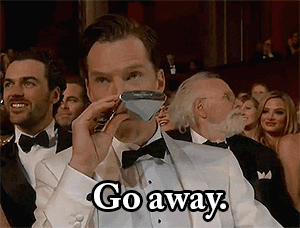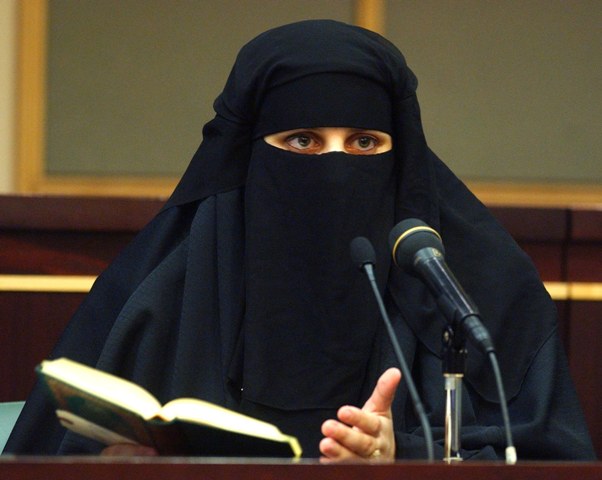I'm sorry, but that was an easy conclusion to come to. You were so negative when describing the niqab, as if one had to be either an abuse victim or a sex worker in order to wear it. I wanted to remind you that some of the most adored women in our religion wore the niqab, so the practice itself is not forbidden and since they engaged in it, it's actually encouraged, like breaking one's fast with dates as the Prophet Muhammad (PBUH) did.
I did not deny that some people have no respect for the diin and pervert the orginial intentions of the niqab. I heard about a couple once that committed sexual acts in a masjid--is that the purpose of a masjid? No. Is that what's expected in a masjid? No. Is that encouraged? No. Simiar to those who pervert the niqab, that's not its purpose.
As for my comments about niqabis, I was drawing from my personal experinces and my personal experinces alone. The ill comments exhibited in this thread about niqabis is incredibly rude and dehumanizes the women who wear them to the extent where I think we forget that niqabis can be pretty amazing people. Is it a generalization? Definitely, I haven't met every single niqabi in this world so I can't honestly speak for them all. But I can speak about my own experinces towards all the pretty amazing role models I encountered in my life.
I have already discussed my thoughts on the women who wear the niqab for un-Islamic reasons: it's not halal. They're not doing it for the sake of Allah (SWT) like they're suppose to, so they aren't getting any ajar. That's like saying performing salat is a bad thing because some people only do it to get out of work or because their parents made them do it. That's not the purpose of salat so that's an irrelevant thing to bring up. Same with the niqab; those who wear it for nonreligious purposes are not relevant to this discussion because we're talking about niqabis who wear it for the diin and the diin only.
(al-Bukhari 5063)
Aisha(R.A.) used to say: "When (the Verse): 'They should draw their veils over their necks and bosoms,' was revealed, (the ladies) cut their waist sheets at the edges and covered their faces with the cut pieces."
(al-Bukhari 4759)
Aa’ishah said: The riders used to pass by us when we were with the Messenger of Allaah (peace and blessings of Allaah be upon him) in ihraam. When they came near us we would lower our jilbaabs from our heads over our faces, and when they had passed by we would uncover our faces.
(Abu Dawood 1562)
The Prophet stayed for three rights between Khaibar and Medina and was married to Safiya. I invited the Muslims to his marriage banquet and there was neither meat nor bread in that banquet but the Prophet ordered Bilal to spread the leather mats on which dates, dried yogurt and butter were put. The Muslims said amongst themselves, "Will she (i.e. Safiya) be one of the mothers of the believers, (i.e. one of the wives of the Prophet ) or just (a lady captive) of what his right-hand possesses?" Some of them said, "If the Prophet makes her observe the veil, then she will be one of the mothers of the believers (i.e. one of the Prophet's wives), and if he does not make her observe the veil, then she will be his lady slave." So when he departed, he made a place for her behind him (on his camel) and made her observe the veil.
(al-Bukhari 4213)
A woman called Umm Khallad came to the Prophet(peace and blessings upon him) while she was veiled. She was searching for her son who had been killed (in the battle) Some of the Companions of the Prophet (peace and blessings upon them) said to her: You have come here asking for your son while veiling your face? She said: If I am afflicted with the loss of my son, I shall not suffer the loss of my modesty. The Messenger of Allah (peace and blessings upon him) said: You will get the reward of two martyrs for your son. She asked: Why is that so, Messenger of Allah? He replied: Because the people of the Book have killed him.
(Abi Dawood 2488)
It was narrated from Aisha" that Safwaan ibn al-Muattal al-Sulami al-Dhakwaani was lagging behind the army. He came to where I had stopped and saw the black shape of a person sleeping. He recognized me when he saw me, because he had seen me before Hijab was enjoined. I woke up when I heard him saying "Inna Lillaahi wa inna ilayhi raajioon (verily to Allah we belong and unto Him is our return)," when he saw me, and I covered my face with my Jilbab."
It's not just a "cultural thing" and you know it. Wearing the niqab is sunnah.
so what its still not obligatory infact according to the shafii madhab
as for the hadiths and verses it is merely encouraged but the issue on weather the niqab should be forced upon or obligated is another matter all together
according to shafii
As for a free women, all her body is her ʿawra, apart from her face and hands—Nawawī states, up to the wrists—because of the verse, (and let them not display their beauty (zīna) except what [usually] appears of it).Ibn ʿAbbās states that [what is excepted] refers to her face and her hands, because the Prophet (pbuh) prohibited women in the state of iḥrām from wearing a niqāb and gloves. If the face and hands were part of the ʿawra, it would not have been impermissible (ḥarām) to cover them, and [in addition, everyday] needs require showing one’s face in buying and selling, and showing one’s hands in giving and taking, so they have not been made part of the ʿawra.
One may also draw upon the ḥadīth narrated by Abū Dāwūd that Asmāʾ b. Abī Bakr entered upon [the house of] the Prophet (pbuh) wearing a thin dress, and the Prophet turned away from her saying, “O Asmāʾ, when a woman reaches puberty, only these two should be visible,” and he pointed at his hands and face.
as for the hiab
Let them place their headscarves (khumur-i-hinn) upon their chests (juyūb-i-hinn)). Khumur is the plural of khimār, which means headscarf; juyūb is the plural of jayb, which means the part of the garment that exposes the cleavage area. Thus women have been commanded to drape their headscarves in such a way as to cover their necks and chests, and not to leave them uncovered in the way of the women of pre-Islamic times.
If covering the face were an obligation, the verse would have stated so explicitly and commanded [them] to place their headscarves over their faces, in the same way that it explicitly mentions placing it over the cleavage area, and this is why Ibn Ḥazm states.
God I has thus commanded them to place their headscarves upon their chests, and this is a textual proof that the ʿawra, the neck, and the chest ought to be covered, and it is also a textual proof that showing one’s face is permitted, and nothing else is possible in any case.
 you welcome abayo
you welcome abayo







